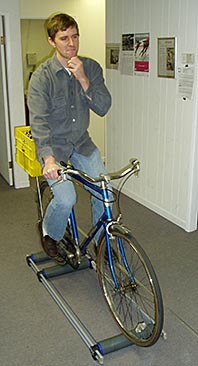Using Other People's Knowledge to Increase Your Own
Interview with an IdeaConnection Problem Solver
Andrew Kyle trained as a mechanical engineer, and since leaving university has been involved in a lot of technology start-ups and alternative energy companies. For the last few years he has used his experience to branch out into consulting, and he has one patent to his name.
He was drawn to IdeaConnection to create a new revenue source and to have some fun. He spoke to IdeaConnection about his experience as a solver.
 I like the collaborative side of things on IdeaConnection, so instead of working by yourself, which you do on other open innovation websites, you get to work with a facilitator and a select team. So it supplements your knowledge with other people's knowledge. You work with people that are out of your comfort zone which I really enjoy because it pushes you to do more research into a challenge and push back against other people and really make innovative kinds of solutions.
I like the collaborative side of things on IdeaConnection, so instead of working by yourself, which you do on other open innovation websites, you get to work with a facilitator and a select team. So it supplements your knowledge with other people's knowledge. You work with people that are out of your comfort zone which I really enjoy because it pushes you to do more research into a challenge and push back against other people and really make innovative kinds of solutions.How many challenges have you worked on with IdeaConnection?
Six.
What success have you had with those challenges?
So far I've had success with one. The solution seeker was having trouble understanding what would happen if local energy producers (like people with solar panels on their houses) produce more energy than they need and feed it back into the grid. How would that affect the upstream energy production load balancing?
The energy grid is only made to be a one-way network, so the seeker was interested to know if all these people like local businesses and houses started having solar panels and windmills how would the grid react?
We answered the questions really clearly, and they obviously enjoyed that.
How long did it take you to come up with a solution?
It was relatively quick, about a week or so. I was somewhat familiar with the industry, I had worked in alternative energy generation.
What did the financial reward mean to you?
It made me feel that what I know is appreciated and that even large and medium companies need outside advice.
The facilitator really helps to keep people on schedule and to make sure everyone is contributing. They don't force people, but if someone's promised something, they'll remind them to contribute that.
How do you find the experience of working with strangers, people from different cultures and backgrounds?
To date it's been relatively good. Usually in a first discussion, the first thing a facilitator will ask will be to disclose a little bit about our backgrounds, so that gives you a bit more rapport with who you are dealing with.
Is the rapport important to help you innovate?
I think so. One thing that the IdeaConnection website does which is really nice is that you can link with someone else who you have dealt with.
Do you have an idea of the solution before you start on a challenge?
Yes I usually do. A couple of them I've come in quite cold and just started with a blank sheet of paper, and a few times I've changed my mind set. But I always have some kind of conceptual model, I think everyone does. And then it's a matter of openly discussing all the models and seeing which ones appears to be the best solution.
How does ThinkSpace help with this?
The helpful part is that it keeps track of information fairly well. I found it most useful for writing down information and having it in one area. Some people like to post documents into the ThinkSpace just to keep them in a central location. It's useful.
Do you use any thinking tools?
I have used mind mapping software before, and it helps to lay everything out and see the whole picture, especially when people are getting confused about complex subjects. It really helps to put things into perspective in a visual sense. It's not the perfect tool for a creative solution, but it gives clarity.
What are the most satisfying parts of working on challenges with IdeaConnection?
Usually the start and the finish. I trained in an industry that is built around challenge solving, and I really enjoy that. So having someone throw a challenge at me with money behind it means that there is some worth there, and some value. And it means to me that there are smart people in the world who need other people in the world to increase their knowledge bank and they're willing to pay for it. So seeing that I get excited.
And leaving the money to one side, the challenge to me is more interesting than the financial reward. It's the ability to learn something new and to expand on common knowledge that I find really intriguing, and use other people's knowledge to increase my own.
I recently worked on a challenge that was to do with a wireless device which is not in my scope of knowledge. There were a couple of electrical engineers in this group and a couple of technicians and that was really exceptional because I increased my knowledge of that industry, and now I know more. If I had just done it myself I wouldn't have been able to achieve that personal success.
Will you work on more challenges?
Yes I have signed up for a few more, and I have one that is currently active.
